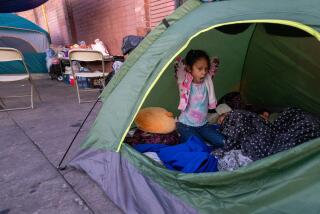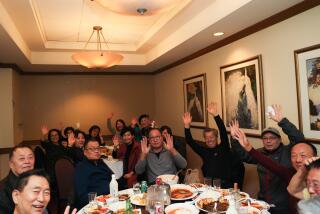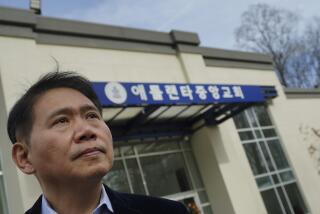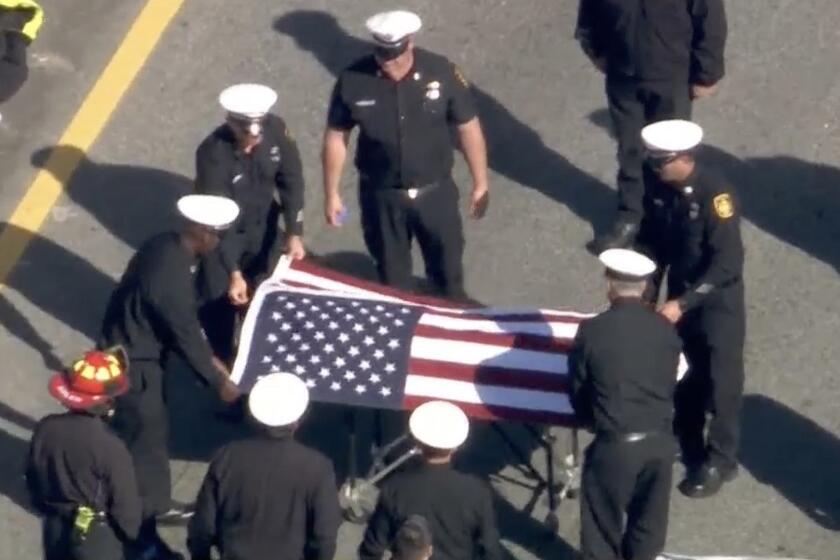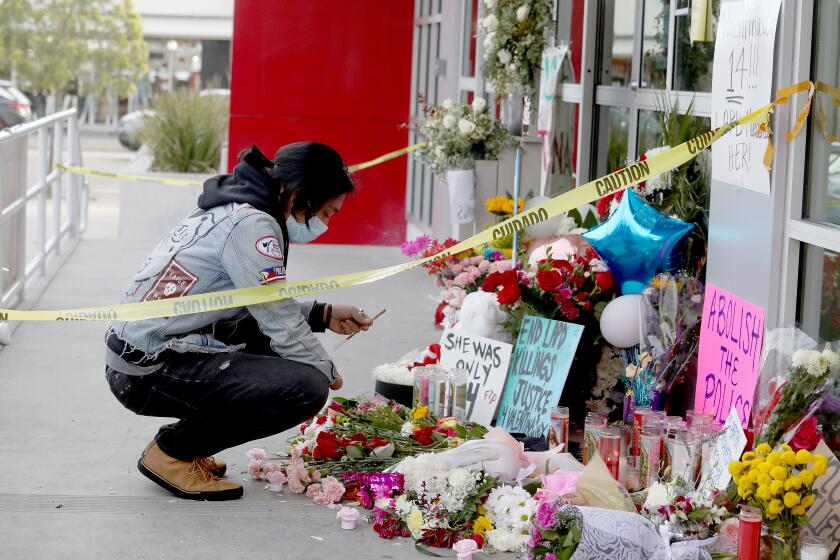Leading His Flock of Refugees to Asylum
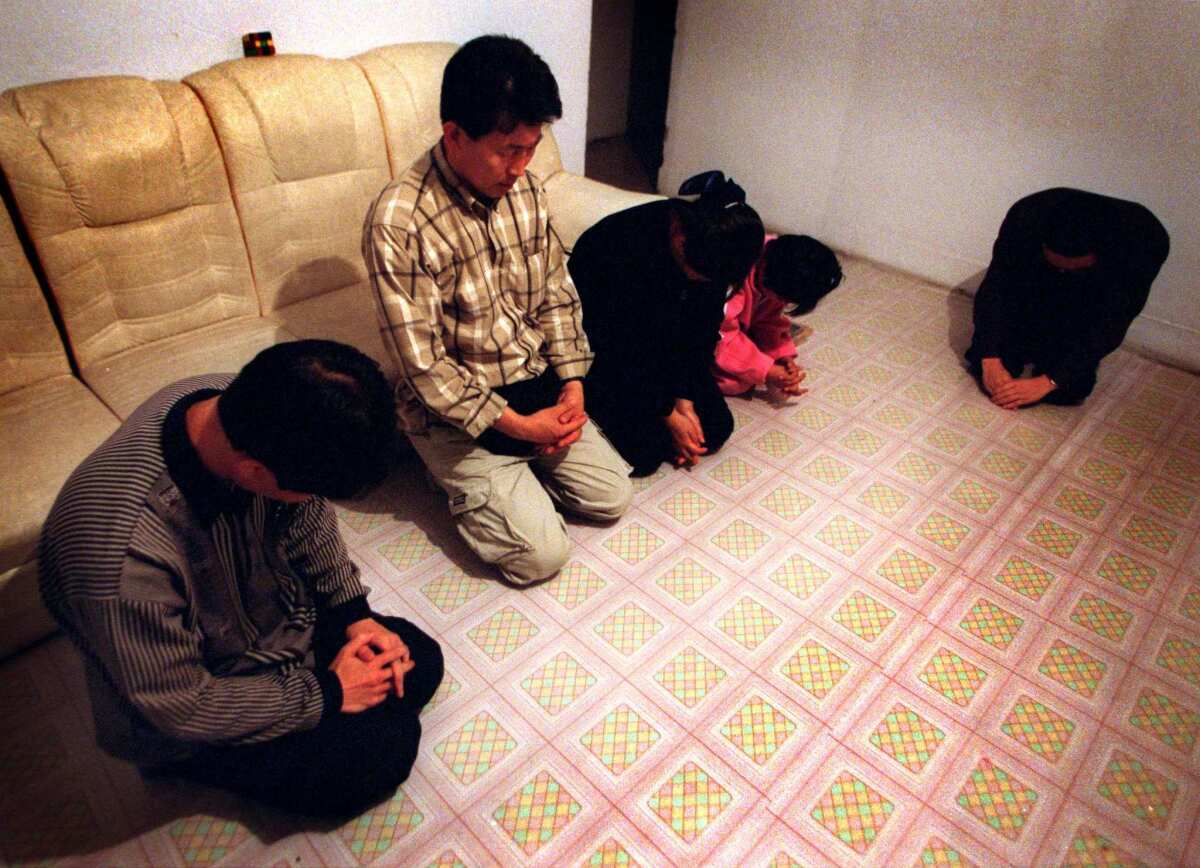
ERENHOT, China -- It is their last supper together, and the shepherd has gathered his small flock of North Koreans around a table piled with steaming plates of shredded pork, rice and braised tofu. But the seven refugees are too nervous to do more than nibble.
Among them: a woman claiming to be an elite worker in North Korea’s nuclear missile program; a muscular former soldier whose heavily scarred arms attest to a previous escape attempt; a woman who had been sold as a bride. Urged to “be strong, be cold,” she is leaving her toddler behind.
Their guide and pastor is Chun Ki Won, an affable South Korean who once sold golf clubs to high-flying Japanese businessmen. Despite his good nature and Christian heart, Chun doesn’t really trust his charges. Still, he is risking his life to help them.
“We’re at the last moment,” Chun says now as they grip one another’s hands and pray. The women weep softly. “Please God, keep us safe. Please let them be all right.”
These “chosen ones” are at one of the final stops on an underground railroad to freedom in South Korea. Each started the journey by slipping across the border to China, where they sought out or stumbled upon a network of safe houses in which Christian missionaries hid them and taught them religion before spiriting them hundreds of miles across northeastern China.
In just one hour, they will attempt to crawl under a 7-foot barbed-wire fence into Mongolia. If things go well, the next time Chun sees them will be in Seoul.
If not, they could die. Deep down, Chun is also nervous, for he knows that danger is all around. The elements could foil them, or if Chinese authorities capture the group and send them back to North Korea, they could be beaten or even executed.
On the tiny screen of his video camera, he shows them footage of the terrain ahead: the dirt-and-sand road that parallels the fence; the foot-high prongs meant to keep out trespassers; and their goal, the Mongolian watchtower in the distance. They can rejoice if they get that far, even though they’ll temporarily go to jail. Chun has bribed the Mongolians to hand the group over to South Korean Embassy officials.
“Move quickly. Don’t run,” Chun instructs them in the most reassuring voice he can muster. “There could be trucks, or guards or dogs.”
If they are stopped, he warns, only the two who are fluent in Chinese should speak. They are to identify themselves as shepherds accompanying foreign scientists studying “desertification” of the plain. They are en route to their house down the road. They are to gripe that the researchers aren’t paying them enough.
“I’ve had to lie ever since I met you guys,” Chun jokes, acknowledging his mission’s moral compromises and small payoff. Experience has taught him that assimilation is difficult and that if they make it to the South, these North Koreans will likely be trading one form of misery for another: Most won’t work; won’t help others escape; won’t go to church or pray. They’ll squander their money on gambling and booze.
“They always cry in front of me before they go,” Chun says. “They say, ‘I’ll live the rest of my life for Him.’ But they always forget it.”
They may do far worse and report him to authorities. One missionary, Kim Dong Shik of Lynchburg, Va., has disappeared and there is speculation that he was kidnapped by North Korean police.
“You never know which one will betray you,” Chun says.
Defections on Rise
War split the Korean peninsula half a century ago, dividing millions of families. North and South are technically still at war, and their border is the most heavily militarized in the world. Despite its fitful expressions of interest in reform and rapprochement, North Korea remains one of the most closed societies on Earth.
Until a few years ago, at most a few dozen North Koreans managed to defect to the South each year.
But Chun and others like him have led hundreds to freedom by taking them first in the opposite direction, into the Chinese hinterlands. Their motivation is Christian charity as well as a yearning to reunite the Korean peninsula.
Thanks largely to the efforts of Chun and other activists, 583 defectors showed up in Seoul last year, nearly double the number that arrived in 2000. At least 838 have arrived so far this year, a few at a time.
Chun got involved after visiting China in August 1999, when he saw a North Korean woman being sold as a bride to a Chinese man while her husband stood helpless. He also met a young girl who woke up one morning to find that her mother and sister had been sold, leaving her to beg in the streets.
“I could not erase the sense of helplessness of that man and young girl who saw their families sold right before their eyes,” he recalled. “It tormented me.”
Since then, he has helped more than 150 refugees get to Seoul.
An additional 350 wait in his safe houses north of the winding Tumen River, which forms the border. On one side is North Korea, a land where famine has killed an estimated 2 million people in the last decade. On the other is northeastern China, where markets groan with beef, apples, bananas, green vegetables, spices and the Korean staple, kimchi.
North Korea comes clearly into view from some vantage points on the Chinese side. Occasionally, a soldier can be seen sitting on the riverbank. Along one bend, a huge portrait of Kim Il Sung stares down from a bucolic railroad station. Bald mountains, stripped of trees for firewood, expose their bulging ribs.
The North Korean town of Namyang, seen through a pay-per-view telescope, seems eerily unpopulated; its low-slung buildings appear to be mostly empty.
Refugees say daily existence there is filled with horrors. They report that they subsisted on roots and leaves boiled into putrid soups; witnessed authorities shooting people who stole corn from the fields; saw loved ones starve to death and buried them in old rice sacks on mountain slopes packed with bodies.
In order to get out, North Koreans might use a watch, trinket or the equivalent of a few dollars to bribe the bedraggled guards sitting sentry every few hundred feet. Or they might evade the guards and then wade or swim to the sparsely guarded Chinese side. In winter, they can trot across the river’s icy bends.
Once in China, poor and malnourished children have prowled the open-air market in Tumen to beg for food. Adults sought out work on farms or in factories. Some have been desperate enough to storm into diplomatic missions in a bid to gain sanctuary.
Their presence has become increasingly uncomfortable for authorities, and China has been cracking down. China considers the North Koreans economic, rather than political, refugees--people who, like millions around the world, simply seek a better life elsewhere. It has a treaty with North Korea, traditionally an ally, to return the refugees. North Korean soldiers also have crossed the porous border to round them up.
Although refugees can blend in physically because the area is heavily ethnic Korean, those who can’t speak at least rudimentary Mandarin rarely venture outdoors.
The underground railroad is one of the few ways out of this predicament. Refugees know that it is largely run by Christian missionaries. Even though it is an alien concept for people brought up in an atheist society, they know that it improves their odds if they are religious -- or at least pretend to be.
They also learn that the South Korean government provides each defector a relocation bonus of about $28,000, housing, and job training -- an astounding package for people who have earned at most a few hundred dollars their entire lives.
Missionary’s Motivation
Divorced with two children in their early 20s, Chun, 46, has an easy laugh and a quick wit that he uses to put edgy refugees at ease. He worked his way up from waiting tables to managing a hotel in Seoul, which he did for 17 years. Flush with success, he launched ventures that boomed and failed, including a golf equipment business in Tokyo and a Japanese-style restaurant in Seoul. The failed ventures saddled him with $200,000 in debt. He sold his home and furnishings and sent his children to live with friends.
For months, he subsisted on noodles and scraped together subway fare. He contemplated suicide and kept a bottle of pills handy. He gradually came to view the tough times as a sign from God that he wasn’t meant to be a capitalist. He is studying now to be a Presbyterian minister.
Drawn to helping North Koreans and the idea of unifying the two Koreas, he established a mission he named Durihana, meaning “two become one.” It survived on donations from about 600 subscribers. Providence seems to smile on him just when he is most desperate, Chun says. Once when he had run out of money, one of the largest churches in Seoul, Durae Presbyterian, gave him $10,000 to help the North Koreans.
Chun’s mission pays for safe houses in China. For food. For train tickets to the border. And for Korean-language Bibles. He takes most of the refugees through Mongolia, but has routes through the jungles of Vietnam and on to sympathetic, non-Communist countries such as Thailand and Cambodia.
Maps of the escape routes decorate the walls of the modest apartment four flights above a restaurant that serves as both Chun’s home and Durihana’s offices.
Before heading to China to pick up a group of refugees, he quietly lays the groundwork with the South Korean government. The underground railroad is so sensitive that top South Korean officials say little about it on the record. It is not clear how they feel about Chun. However, Chun says five government agents regularly tail him in Seoul.
In this case, Chun knows authorities will want to debrief the woman who works in the missile factory. The higher the Communist party rank in North Korea, the more thrilled the government is.
Once in Seoul, North Koreans are interrogated to determine whether they are who they say they are. Because the northerners have no passports, birth certificates or other documents, the South Koreans are always on the lookout for spies, or for Chinese pretending to be North Koreans to get the resettlement bounty. Then it’s off to a residential camp where they learn how to shop, use the subway and Internet, and drive.Chun sets out from home early on a Saturday morning on this trip, leaving behind his girlfriend and his two beloved dogs--a schnauzer and a poodle--named Duri and Hana.
Flight to China
Aboard a direct flight from Seoul to Changchun in northeastern China, Chun fiddles with his newest gadget, a hand-held global positioning device. It will come in handy in the Chinese hinterlands.
He is met at the dingy airport by a Korean Chinese missionary whose cell phone rings to the tune of “Amazing Grace.” In a beat-up truck, they head to nearby Jilin and a safe house located in a cluster of drab buildings. The local missionary helps Chun with the three suitcases, a box and a knapsack filled with donated clothing.
At this first stop, Chun will minister to refugees’ souls and try to soothe their anxiety; he won’t include any of them on this trip. He realizes that he controls their fate, and it weighs on him heavily. All the same, he has no formula for choosing who will go, and when. The decision is part practical, part political, part gut.
If he brings too many on one trip, they are more likely to be caught and the South Korean government might balk at accepting them. Those with relatives already in the South get preference. He considers the mix as well: whether children should go, and with whom; who is in the most danger; who will do well in the South and who has become a committed Christian.
Chun and the local missionary climb several filthy flights of stairs and slip into a sparsely furnished apartment. Two bare bulbs light a tidy room. The smell of simmering rice wafts in from the kitchen.
Ten North Koreans are sprawled on green-foam tiles that might be found in an American playroom. Futon mattresses lie on the side of the room. A few Korean-language Bibles are strewn about.
Each day, the refugees rise at 5 a.m. to worship and read the Bible. There is little else to do, and the refugees take the stress out on each other. They fight. Fighting is one reason so many get caught; it draws the attention of neighbors, who alert the police.
Chun knows that some of them might be convicts or North Korean double agents. Once, a woman tried to use him as a drug-runner.
Chun still vacillates between sympathy and anger.
“They are just people at the end of their rope,” he says, adding in jest, “If I wasn’t religious, I’d kill them.”
Just now, the group seems quite civilized--and savvy. But they are auditioning for a future trip. They cluster around as Chun preaches, telling the group that faith is not just about praying or reciting the Bible. “It’s about how you deal with people.... If you fight with others, you’re attacking God.”
“Being wealthy is not what makes you happy,” he continues. “When you get to South Korea, you’ll have money and housing. But the South Korean guy who doesn’t have that, has friends and family. Is that fair?”
“If they study one hour, you have to study 10 hours. When they walk, you have to run. In South Korea, you can’t catch up because you’re not in a fair game. You start complaining, and that’s the problem. North Koreans are taught to be lazy. From the time you’re born, everything is free.”
Visiting Safe Houses
This time, Chun’s entire group will be from another area, around Yanji, at the eastern end of the Chinese-North Korean border. Many of the elderly Korean Chinese citizens here arrived when the Korean peninsula and adjacent area were under Japanese occupation from 1910 to 1945. Hence, some of those who come across the border from North Korea have distant relatives to help them.
In the next two days, Chun will shuttle among five safe houses, preaching, reassuring and making his choices.
He stops by one tidy apartment where a woman cares for four North Korean children. They look healthy and well-adjusted--but very small for their ages. For many, it is as if they stopped growing precisely when the famine started in their home country in the mid-1990s.
A 6-year-old boy who looks like he’s 3 cuddles up in a foreigner’s lap. He says he wants to be a minister when he grows up. He was left in a church by his uncle about 18 months earlier, so malnourished he could barely walk. A girl, now 13, was found begging in the market. Two boys who are 10 and 11 but look 6 or 7 were told by their parents that they’d return for them.
The woman tries to pass the younger children off as her own. She has enrolled them in school, and they have rapidly picked up Chinese. Nevertheless, she’s not sure how long she can continue the ruse because Chinese couples are supposed to have only one child.
At another apartment lives an 11-year-old girl who hasn’t been outside the building in three years. Chun fears that nosy neighbors would realize she’s not in school and doesn’t speak Chinese. She came across the river with her mother. An elder sister disappeared in the train station when they arrived.
“I’m going to get you to South Korea,” Chun tells the girl as she draws in a notepad he’s given her. “I know you’ll be a good student.” He asks the girl’s mother to hold out for a little while longer.
After making his rounds, Chun hastily settles on a list of five, and makes calls on his cell phone to the safe houses where they are staying. At the last minute, he decides to add a young couple, bringing the total to seven.
The Seven Chosen
Late on a Monday afternoon, the group assembles in the apartment of a missionary-businessman in Yanji.
There is Chun’s trophy, the 32-year-old woman who claims to have headed a small unit in a North Korean nuclear missile plant. Tiny, with glasses and eyebrows that look as though they were tattooed on, she was an elite cadre in the North Korean Communist party, went to college, learned how to use guns and grenades, and every year reported for reserve duty. Or so she says.
She grew disillusioned when her sister couldn’t get treatment for tuberculosis and malnutrition. She crossed the river to China, where a church helped her get medicine for her sister. But North Korean authorities caught her bringing it back. Police questions about church and karaoke -- “enjoying life,” as she puts it -- made her start thinking about how North Korea controls its people.
“You can’t laugh when you want to laugh or cry when you want to cry,” she says, dabbing at tears. “I could never think of the meaning of life, or religion, because I always had to think of the party.”
She picks at a callus on her hand, developed in 2 1/2 years of farm labor in China. Her saving grace is that she’s learned to speak Chinese reasonably well, which will help on this journey.
Also chosen is a small 35-year-old man with dark curly hair, who is clad in a black jacket. He left North Korea three years ago after his older brother and nephew died of hunger. He worked on a Chinese farm, was captured and spent 14 months in a North Korean labor camp, escaped to China again and has lived for a year in a safe house.
“I couldn’t deny God, and so I was treated like a political criminal in North Korea,” he says. “I want to live for God. I want freedom.”
The muscular build of another 39-year-old defector attests to his 10 years in the North Korean army, where he says he was on a special forces team along the South Korean border.
With his family starving, he headed to China and worked on a farm for two years. But when he got home, he found that his wife and daughter also had fled. He returned to China to try to find them but was caught and sent back to North Korea. He escaped by breaking a window on the train back to his hometown: His forearms still bear the scars.
He says he beat up three policemen when he escaped, so he is not afraid of the authorities. But he is wary of the others in the group, and he asks a reporter about his prospects in South Korea. “Are North Korean refugees doing well in South Korea?” he asks. “Can people have the jobs they want to have? I can do any kind of work.”
A 24-year-old woman with long brown hair was lured to China by the promises of an illicit job broker. Instead, he sold her for $400 as a bride to an ailing Chinese farmer, who took her to his remote village to work on the farm. After she gave birth to the son the family wanted, they began to abuse her.
An acquaintance in the village helped her run away, urging her to leave her 2-year-old behind. “Be strong, be cold,” the acquaintance said. In Yanji, she met an accomplice of Chun’s, who pressed Chun to take her along.
She admits that religion baffles her.
“I cannot believe 100% in God,” she says. Nevertheless, she’s concluded that South Korea and America are more prosperous than North Korea because they are religious. “I want to see with my own eyes what God has done to help the South Korean people,” she says. She seems almost giddy.
Then there is the young couple. The man, 25, is confident, bordering on cocky. He has been sent back to North Korea five times -- four from China and once while trying to escape with Chun through Vietnam. His 20-year-old girlfriend is making her first attempt. She is stylishly dressed and pretty. Chun teases her about her earrings, which she says family members in Yanji gave her. Her parents, a brother and a sister will be on a trip that leaves a week or two later. Carrying a small knapsack, she is the only one to bring any luggage.
The last member of the group is particularly nervous. He was caught once before and sent back. Chun’s mission channeled $10,000 through a web of sources to free him and the cocky 25-year-old. Both had been threatened with execution in North Korea.
Journey to Mongolia
Chun will leave the seven early in the rough four-day trip in a green-and-yellow 1960s-era train to the Mongolian border. A trusted Chinese Korean man will accompany them the rest of the journey and keep in touch with Chun by cell phone.
Chun appoints the missile-factory worker as the group leader.
“She knows everything,” he tells the group, assembled now in the living room of a downtown Yanji safe house. “Just obey her. Don’t ask her any questions.... I told her everything, and I told only her. If I tell everybody everything, you’ll get into a fight. You can’t make it unless you pray to God.”
The woman from the missile factory and the forced bride are to sit together and act like sisters. The couple will stick together, and the other three men will pretend to be friends.
“Now, let’s pray,” Chun says. The group leader weeps softly.
As dusk falls, they slip out of the apartment two by two by three and walk to the train station. Chun pays for their tickets, $50 apiece, for the journey in hard, turquoise seats. They dare not fly or even travel in the train’s sleeping compartment because officials would check for identification cards.
Around them, passengers hoist big burlap sacks onto overhead luggage racks. Dim fluorescent tubes barely light the cars. By the time the seven board the train, just an hour after it started its journey, the squat toilets already reek.
As the train chugs out of the station, the cityscape quickly gives way to fields and horse-drawn carts, illuminated by a brilliant harvest moon. Vendors hawk grilled chicken, corn on the cob and magazines. Four of the seven shell out some of the pocket money Chun has given them, buying several copies of the same magazines. Chun chastises them: “Spend the money carefully. Just buy one and share it.”
Chun uses the time after he has left the train to call on accomplices and visit more safe houses. On his way to Hohhot, the capital of China’s Inner Mongolia province, he is asked which of the seven will do well in South Korea.
The forced bride? “She’ll just be trouble,” he says.
The young couple? “They’ll just give me a hard time.”
Why does he bother, then? He believes it’s his Christian duty.
“If you look at their character, there’s no reason to bring any of them in,” he says. “Some people say, ‘Why don’t you just bring in the good ones?’ But I think that’s wrong. They’re all God’s people, and we have to save them because otherwise they’ll die.... It’s my mission.”
In Hohhot, Chun hires a taxi for the five-hour drive to the border. On the way, a camel occasionally comes into view in the brown fields. Sheep and goats outnumber people. Huge trucks heaped with sacks of potatoes rumble by. He uses the daylight to videotape the fence where the refugees will make their crossing. But the taxi gets stuck in the sand. After several attempts to push it out, the driver flags down one of several trucks working on what appears to be a road-building operation.
He makes a deal with the truck driver to carry a group of “researchers” back to the fence that night on his flatbed. The truck seems like a Godsend. It will take them directly to the crossing point. A previous group had to start farther back and wandered for two days. A 10-year-old boy died of dehydration.
Arrival by Train
Now in a private room of a restaurant in Erenhot, the last town before the Mongolian border, Chun greets the refugees who have arrived by train. He gently teases them.
Relationships among them have clearly changed. The missile worker has become close to -- perhaps even romantically involved with -- the special forces man, according to the Chinese guide who accompanied them. The former soldier was nearly arrested by police for smoking on a railroad platform, putting himself and possibly the entire group at risk.
It is also clear that the group has a new de facto leader: the young man Chun added with his girlfriend at the last minute. He seems the most calm and confident.
Seated at a big round table, Chun tells the group that the Mongolians will confiscate any money and valuables they have, and suggests that they give it all to him for safekeeping. He assures them that he’d give it back when they get to Seoul. But no one gives him a thing.
“Whatever they have is such a small amount. They can’t even get a meal in South Korea with it,” he explains later. “They don’t even trust me -- they think I’m somehow doing this for my own purposes.”
Chun urges them to “eat tonight, even if you’re not hungry,” but the heaping plates of food go largely untouched. They are too nervous.
With Chun’s final advice, they grasp one another’s hands tightly and pray together one last time.
“Let’s thank God,” Chun says.
By now, the forced bride’s giddiness has turned to fear.
The cocky young man says he “won’t sleep till we’re on the plane to South Korea.” Chun gives him a cell phone and tells him to call as soon as the group makes it across the border.
As they climb onto the truck’s flatbed, a fierce wind stings their cheeks. A few snowflakes flutter down as a big full burnt-orange moon rises, turning white as it finds its place high in the sky. The stars littering the sky offer a dim halo of light as the truck gets closer to the border and the Mongolian watchtower comes into view, perhaps a mile away.
The driver pulls up close to the fence, kills the headlights, and the defectors quickly jump 5 feet to the ground. They dash for their lives. It takes them no more than a minute to crawl under the fence and disappear into the night.
Ten minutes later, Chun’s cell phone rings. In a trembling voice, the leader describes where they are. Chun tells them to keep going, that they’ve only made it across the Chinese border but are still inside the no-man’s-land between countries.
Chun is excited too. Things are going even better than planned.
An additional 25 minutes go by. The phone rings again. Nearly out of breath, the leader exclaims, “We’re here!”
Epilogue
Several weeks later, the group would be flown to South Korea.
But on a mission three months later, Chinese authorities arrested Chun and a dozen refugees along the Mongolian border.
Charged with smuggling, he was held for seven months before appeals from South Korea and the United States, and the payment of a $6,000 fine, won his freedom. Though he lived largely on bread and water and his cell was crowded and cold, he says he was spiritually happy in jail. “I guess the words of the Bible kept me going,” he says.
The woman who claimed that she worked in the North Korean missile plant really hadn’t. Her husband had. She now works in a beat-up cell phone factory in a Seoul industrial park. She thinks constantly about the family she left behind in North Korea, especially her 6-year-old son.
“I’m here, amid this plenty, all alone,” she says.
Other refugees who remained in China were caught because they did not have Chinese identification cards.
Among them were the parents and two brothers of the young leader’s girlfriend, as well as the 11-year-old girl who hadn’t been outdoors for years -- and her mother.
Chun has also heard that some of those who were captured offered to inform on him.
But as soon as he got back to Seoul, he was working the phone. Although he won’t be able to return to China because of his arrest, Chun will continue with his mission.
“Now that I have personally experienced a bit of the hardship they’ve gone through,” he says, “I’ll help them even more than before.”
More to Read
Start your day right
Sign up for Essential California for news, features and recommendations from the L.A. Times and beyond in your inbox six days a week.
You may occasionally receive promotional content from the Los Angeles Times.
